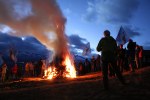News
Point of view: Burning with love, not hate
It began exactly 30 years ago, in the remote Madris high valley in Graubünden close to the border with the Italian Val Bregaglia, when a bonfire was lit as a cry for help and of resistance. As an Alpine shepherd, together with a handful of courageous locals and newer arrivals, I defended myself and my family against a pumped storage and dam scheme, one of a dozen planned throughout the Swiss Alps at that time. The unbridled expansion of the Alpine transit roads, the decline of mountain farming, the advent of snow cannons and ever more ski resorts were pressing issues for us as environmentalists. The fires were the element that connected topics, regions and people: we imagined seeing this light chain as a night-time link from Vienna to Nice.
The spread of sustainability as a fundamental concept of development vindicates the work of the countless pioneers, not least those who tirelessly championed the cause of an Alpine-wide protection treaty from the 1950s on. In 1994 this finally became a reality: since then, the Alpine Convention has set the political framework for economic development in harmony with ecological mindfulness.
But the work is not yet done. The climate crisis is besetting the Alpine region. And a familiar old poison is once again flowing in the veins of many denizens of the Alps: nationalism.
This summer, climate change bared its teeth and afflicted the German-speaking Alpine regions with a severe drought, leading in some places to a general ban on fires. Instead of a Fire across the Alps, therefore, an artistic light display entertained participants at the 30th anniversary event that was staged by Alpen-Initiative, Mountain Wilderness and CIPRA.
Nationalism is celebrating a dark revival, promising cheap solutions to political problems even though it only ever produces one thing: losers. My summer vacation on the turquoise-blue River Soça in Slovenia reminded me of this once more. On the one hand I was fascinated by my encounters with the welcoming people of the Julian Alps that transcended language barriers and national borders. On the other, the scars of the Isonzo front can be seen on the mountain slopes and in the villages, awakening gruesome memories of the First World War. In the name of nationalist ideals, Slovene, Austrian, Hungarian, German and Italian soldiers fought each other for two years up on the mountain ridges and down in the valleys, with some 200,000 losing their lives.
So it is again up to us, today’s inhabitants of the Alps, to stand up to both of these threats, to nationalism and the climate crisis: with innovation and modesty, with openness and humanity, connected across mountains and borders, so that the fires do not burn in the form of wars or forest fires, but rather for each other, in our hearts.



